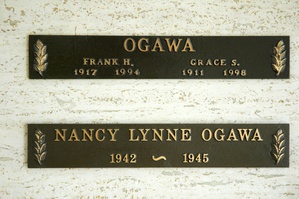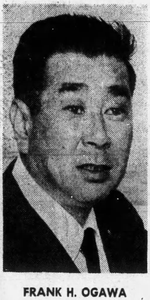 CC SA-BY Our Oakland
CC SA-BY Our Oakland
Frank Hirao Ogawa (May 17, 1917 – July 13, 1994) was a civil rights leader and civic leader. He was the first Japanese-American on the Oakland City Council, and served from 1966-1994, the longest tenure of any Oakland council member.
Frank was a Nisei (second generation Japanese) born in Lodi, CA, but like many Japanese-Americans during WWII he and his wife Grace Sumiye Hiruma (Ogawa) (May 10, 1911–February 23, 1998) were forced to sell their possessions and were imprisoned in an internment camp. Their daughter, Nancy Lynne Ogawa (September 27, 1942 – March 25, 1945), was born in the Topaz War Relocation Center in Utah and died at age 2 in 1945. But the mistreatment didn't turn Frank against the U.S. The Ogawas also had a son, Alan Ogawa.
After release, Frank returned to Oakland and found work as a gardener, and became active in the community and civil rights. He saved money until he was able to open his own nursery.
Frank served on the city council for almost 30 years, and held various other public offices: 1, 2
- Oakland Parks Commission
- San Francisco Bay Conservation and Development Commission
- Bay Area Air Quality Management District
Ogawa was first appointed to city council in 1966 to fill the seat of mayor-designate John Reading, who had been appointed mayor by the council to replace mayor John Houlihan, who had been indicted on embezzlement charges. 3,4
Death, Burial and Legacy
 CC SA-BY Our Oakland
CC SA-BY Our Oakland
Frank died in 1994 of lung cancer. Grace died in 1998. Frank, Grace and Nancy are interred at Mountain View Cemetery.
Congresswoman Anna Eshoo of California in her tribute to Ogawa 1 said:
"Frank Ogawa was a remarkable person because he could take personal misfortune and turn it into a positive learning experience for himself and others. When Frank and Grace Ogawa were forced to sell their belongings and live in internment camps during World War II, they had to sleep on straw mattresses in horse stalls for six months before being shipped to a camp in Utah to spend another 3 1/2 years in confinement. Despite this mistreatment and injustice, he never lost faith in the United States. Just the opposite—he strived to prove his loyalty to his country and became an internationally recognized champion of Asian-Americans in the process."
There are a number of sites around Oakland named for Frank Ogawa or dedicated to him:
- City Hall Plaza was renamed Frank Ogawa Plaza in his honor by a unanimous city council vote
- the Frank Ogawa Firescape Garden was named in his honor
- William D. Wood Park was created in part with contributions from the Ogawa Nursery
- the Torii Gate in Lakeside Park was dedicated in his memory
Links and References
- Tribute to Frank H. Ogawa, Anna G. Eshoo in House of Representatives, July 21, 1994
- Frank H. Ogawa on Wikipedia
- Ogawa Is Named to Council Oakland Tribune April 1, 1966 (p2)
- Once Rejected by Oakland, Ogawa Now Sits on Council Oakland Tribune April 10, 1966




